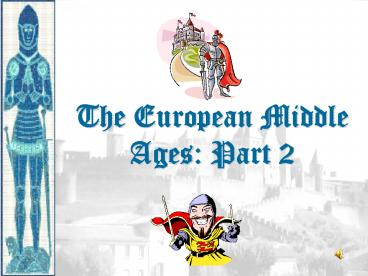The%20European%20Middle%20Ages:%20Part%202 - PowerPoint PPT Presentation
Title:
The%20European%20Middle%20Ages:%20Part%202
Description:
Periodization Early Middle Ages: 500 1000 High Middle Ages: 1000 1250 Late Middle Ages: 1250 - 1500 William the Conqueror: Battle of Hastings, 1066 ... – PowerPoint PPT presentation
Number of Views:209
Avg rating:3.0/5.0
Title: The%20European%20Middle%20Ages:%20Part%202
1
The European Middle Ages Part 2
2
Periodization
Early Middle Ages 500 1000 High Middle Ages
1000 1250 Late Middle Ages 1250 - 1500
3
William the ConquerorBattle of Hastings,
1066(Bayeux Tapestry)
4
King Harolds Death?
5
King Harolds Death?
6
William the Conqueror
7
The Death of William the Conqueror
Age doesn't seem to have mellowed William
much. He was still frequenting battlefields in
his early sixties. While fighting the French at
the Battle of Mantes, he was thrown against the
pommel of his saddle so violently that his
intestines burst. Five weeks later -- on
September 9, 1087 -- England's conqueror died.
His servants stripped him bare and abandoned his
body, but a kind-hearted knight arranged a
funeral for him at the abbey of St. Stephen in
Caen. The funeral was disrupted by the
outbreak of a fire. After extinguishing it, the
pallbearers tried to cram the king's bloated
corpse into a too-small sarcophagus. The body
exploded, creating a horrible smell that sent
mourners running for the exits. Over the ensuing
centuries William's tomb was twice desecrated by
French rebels -- an ignoble end for one of
history's greatest conquerors.
8
Feudalism
A political, economic, and social system based on
loyalty and military service.
9
The Power of the Medieval Church
- bishops and abbots played a large part in the
feudal system. - the church controlled about 1/3 of the land
in Western Europe. - tried to curb feudal warfare ? only 40 days a
year for combat. - curb heresies ? crusades Inquisition
- tithe ? 1/10 tax on your assets given to the
church. - Peters Pence ? 1 penny per person paid by
the peasants.
10
The Medieval Manor
11
Life on the Medieval Manor
Serfs at work
12
Pope Urban II Preaching a Crusade
13
Setting Out on Crusade
14
Map of the Crusades
15
Christian Crusades East and West
16
King Richard I
17
(No Transcript)
18
Richard Watches Massacre
- A grim scene of Richard Coeur de Lion massacring
his Saracen hostages in the Holy Land. From his
balcony, Richard complacently observes the
gruesome spectacle. Headless corpses are piled up
beneath a platform on which two blindfolded men
are about to be beheaded. Others await their
turn, while soldiers lead the next victims to the
ladder.
19
- Tomb-effigy of King Richard I at Fontevrault Abbey
20
The Childrens Crusade (1212)
21
The Road to Knighthood
KNIGHT SQUIRE PAGE
22
Romanesque Architectural Style
- Rounded Arches.
- Barrel vaults.
- Thick walls.
- Darker, simplistic interiors.
- Small windows, usually at the top of the wall.
23
Carcassonne A Medieval Castle
24
Parts of a Medieval Castle
25
Chivalry A Code of Honor and Behavior
26
King John I
Born 1167 Crowned 1199 Died 1216
27
Magna Carta, 1215
- King John I
- Great Charter
- monarchs were not above the law.
- kings had to consult a council of
advisors. - kings could not tax arbitrarily.
28
Gothic Architectural Style
- Pointed arches.
- High, narrow vaults.
- Thinner walls.
- Flying buttresses.
- Elaborate, ornate, airier interiors.
- Stained-glass windows.
Flying Buttresses
29
Late Medieval Town Dwellings
30
Medieval Trade
31
Medieval Guilds
Guild Hall
- Commercial Monopoly
- Controlled membership apprentice ? journeyman
? master craftsman - Controlled quality of the product masterpiece.
- Controlled prices
32
Medieval Guilds A Goldsmiths Shop
33
Joan of Arc
34
The Beginnings of the British Parliament
- Great Council
- middle class merchants, townspeople burgesses
in Eng., bourgeoisie in Fr., burghers in Ger.
were added at the end of the 13c. - eventually called Parliament.
- by 1400, two chambers evolved
- House of Lords ? nobles clergy.
- House of Commons ? knights and burgesses.































